Leadership Approaches and Change Management: A Critical Analysis
VerifiedAdded on 2023/01/09
|13
|857
|40
Report
AI Summary
This report provides a comprehensive overview of leadership and change management within organizations. It begins by exploring various leadership theories, including situational, transformational, behavioral, contingency, democratic, and delegative approaches, highlighting their application in managing change. The report then delves into key models and frameworks, such as Kotter's 8-step model and Lewin's 3-step model, illustrating their practical implementation in facilitating organizational change. A critical evaluation of different leadership approaches is presented, considering their effectiveness in addressing employee resistance and ensuring successful change implementation. The conclusion emphasizes the importance of adapting to internal and external drivers of change for sustainable business performance. The report includes references to relevant academic sources.
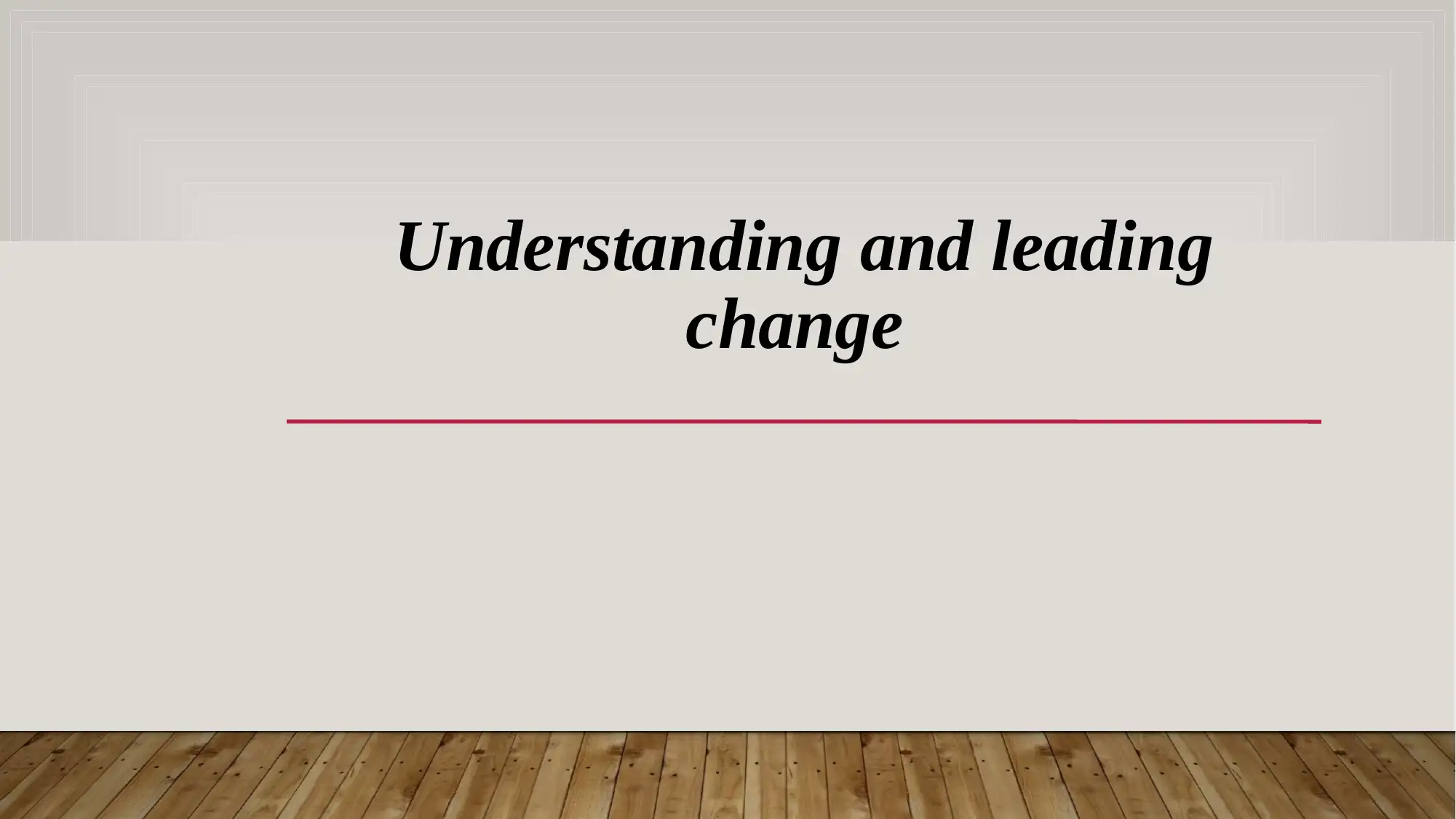
Understanding and leading
change
change
Paraphrase This Document
Need a fresh take? Get an instant paraphrase of this document with our AI Paraphraser
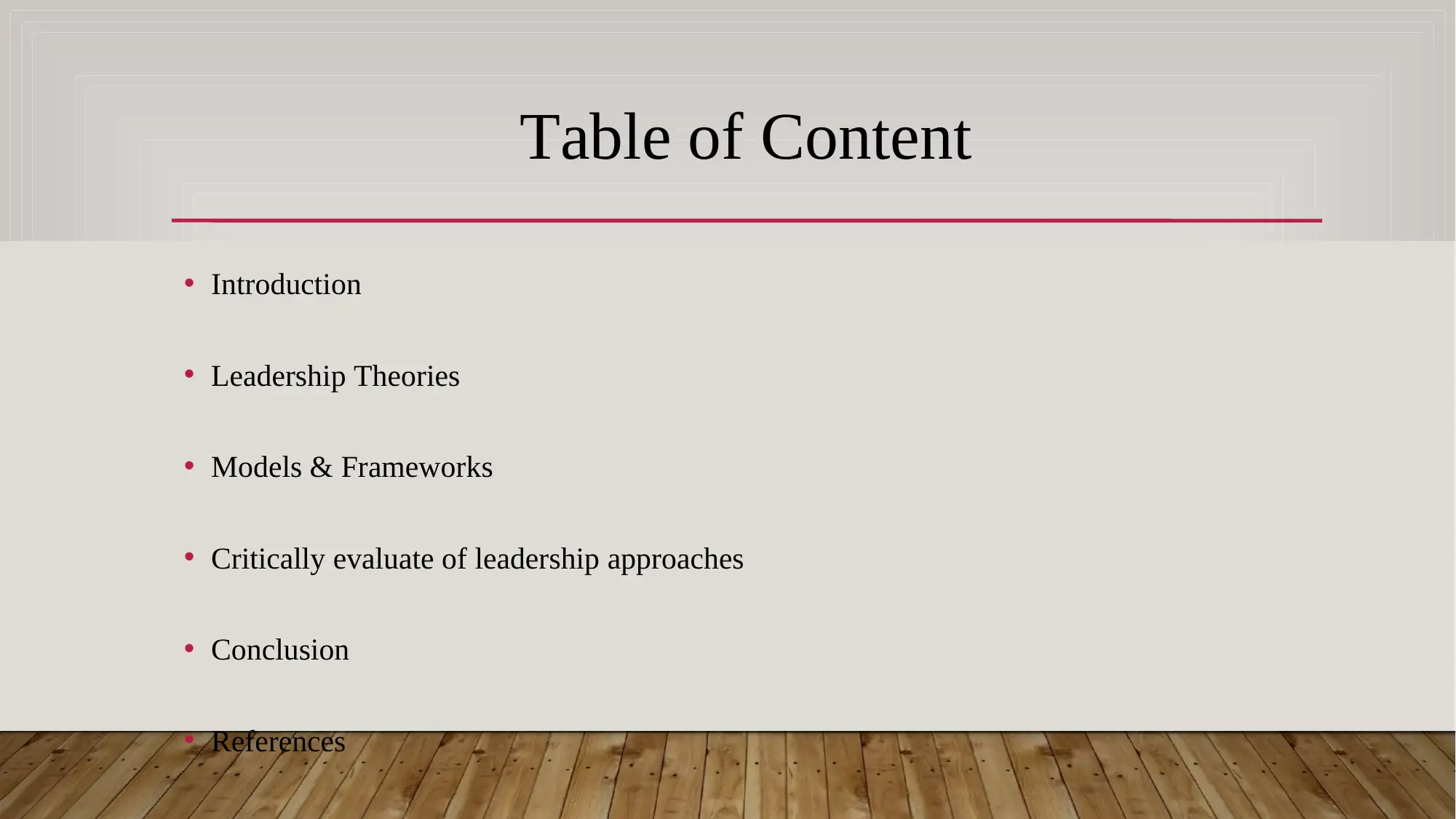
Table of Content
• Introduction
• Leadership Theories
• Models & Frameworks
• Critically evaluate of leadership approaches
• Conclusion
• References
• Introduction
• Leadership Theories
• Models & Frameworks
• Critically evaluate of leadership approaches
• Conclusion
• References
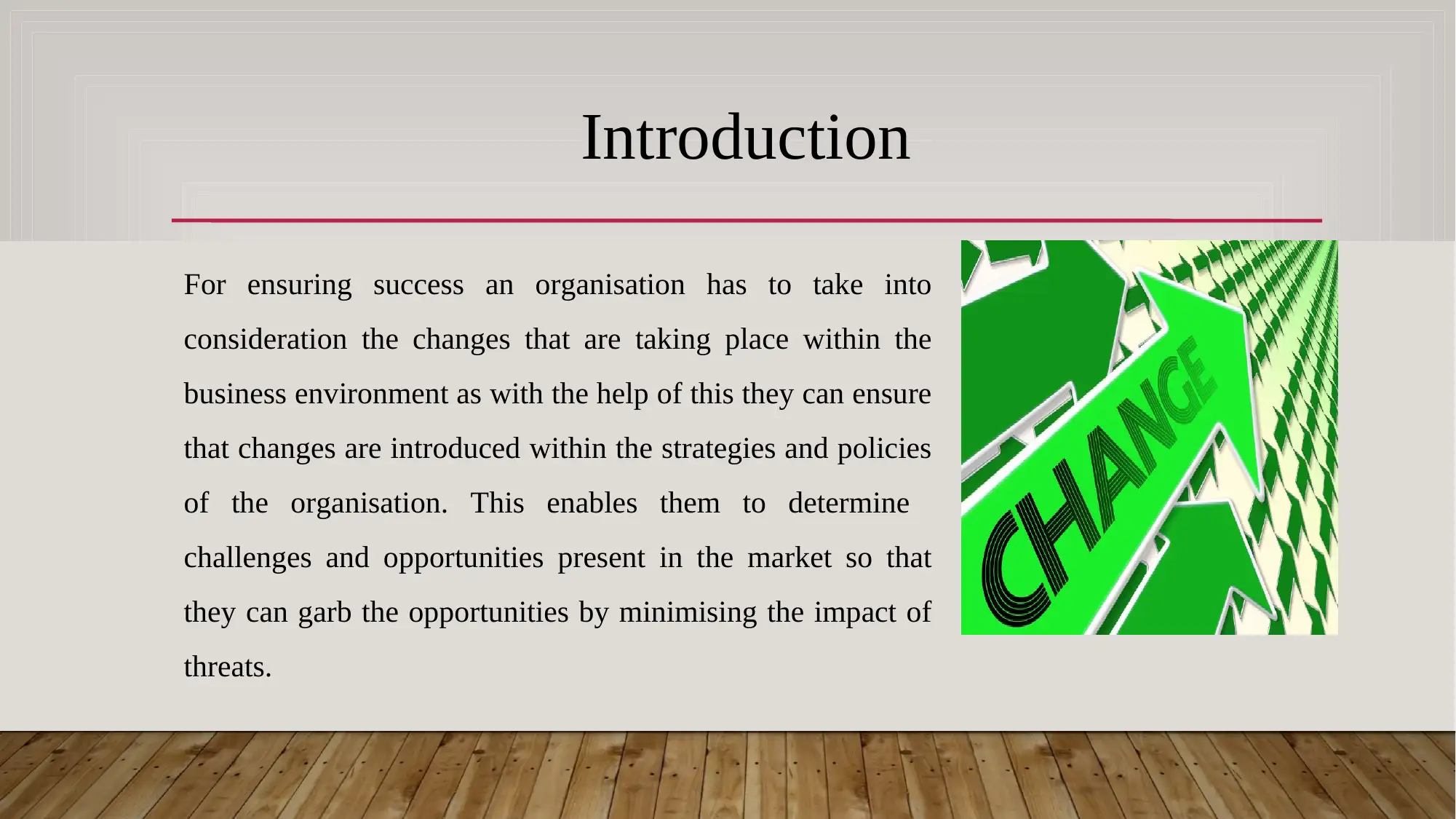
Introduction
For ensuring success an organisation has to take into
consideration the changes that are taking place within the
business environment as with the help of this they can ensure
that changes are introduced within the strategies and policies
of the organisation. This enables them to determine
challenges and opportunities present in the market so that
they can garb the opportunities by minimising the impact of
threats.
For ensuring success an organisation has to take into
consideration the changes that are taking place within the
business environment as with the help of this they can ensure
that changes are introduced within the strategies and policies
of the organisation. This enables them to determine
challenges and opportunities present in the market so that
they can garb the opportunities by minimising the impact of
threats.
⊘ This is a preview!⊘
Do you want full access?
Subscribe today to unlock all pages.

Trusted by 1+ million students worldwide
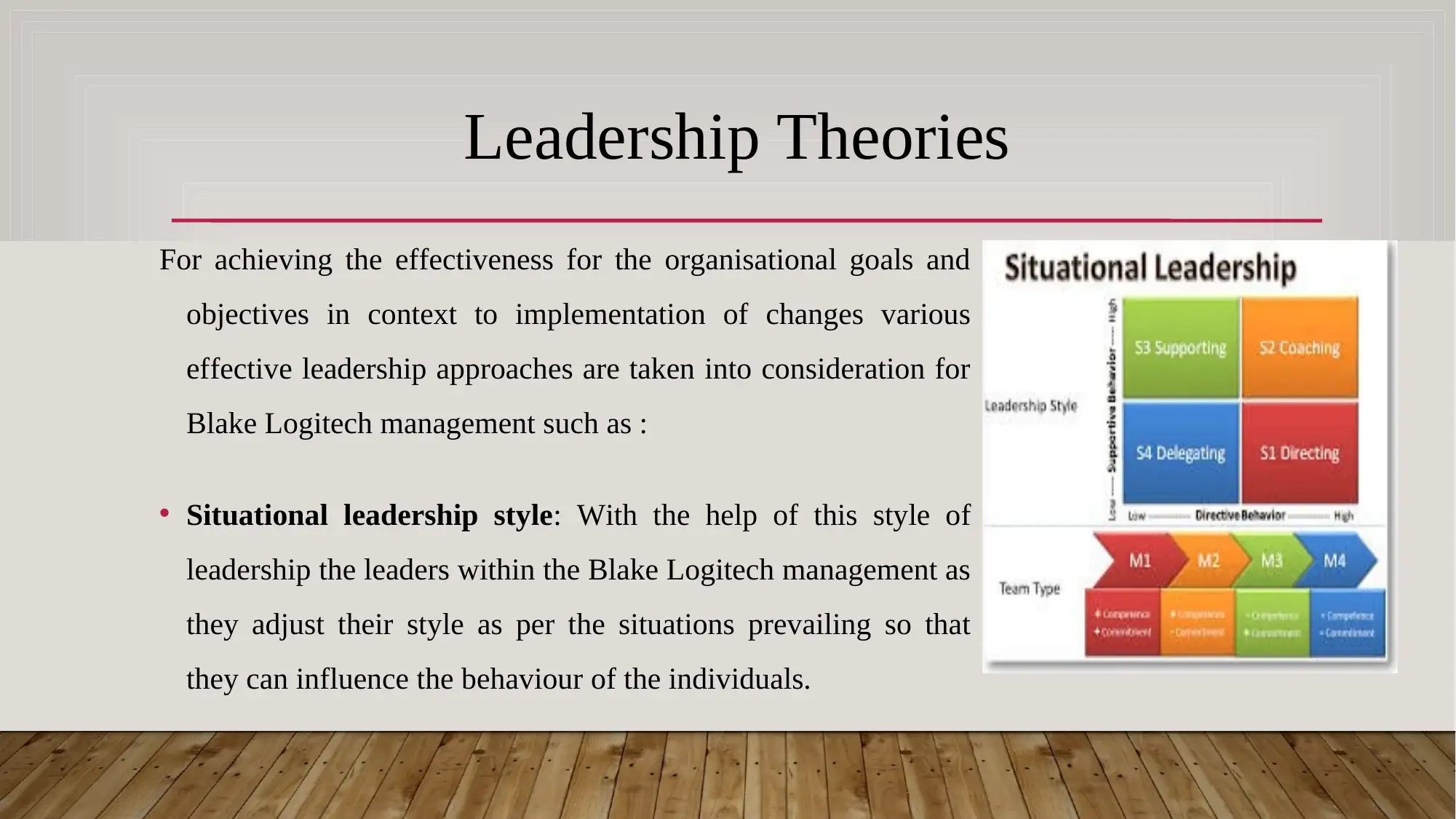
Leadership Theories
For achieving the effectiveness for the organisational goals and
objectives in context to implementation of changes various
effective leadership approaches are taken into consideration for
Blake Logitech management such as :
• Situational leadership style: With the help of this style of
leadership the leaders within the Blake Logitech management as
they adjust their style as per the situations prevailing so that
they can influence the behaviour of the individuals.
For achieving the effectiveness for the organisational goals and
objectives in context to implementation of changes various
effective leadership approaches are taken into consideration for
Blake Logitech management such as :
• Situational leadership style: With the help of this style of
leadership the leaders within the Blake Logitech management as
they adjust their style as per the situations prevailing so that
they can influence the behaviour of the individuals.
Paraphrase This Document
Need a fresh take? Get an instant paraphrase of this document with our AI Paraphraser
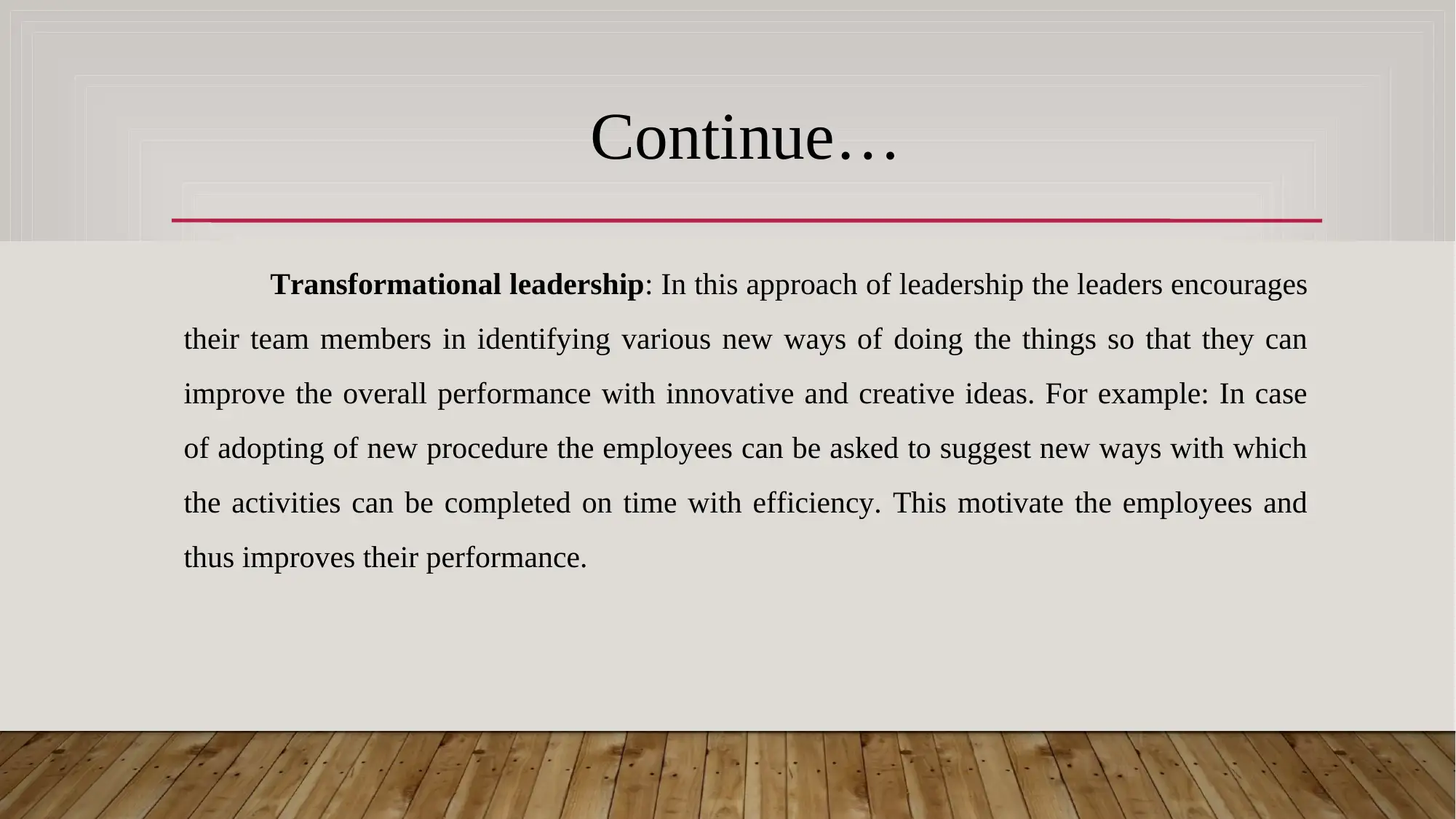
Continue…
Transformational leadership: In this approach of leadership the leaders encourages
their team members in identifying various new ways of doing the things so that they can
improve the overall performance with innovative and creative ideas. For example: In case
of adopting of new procedure the employees can be asked to suggest new ways with which
the activities can be completed on time with efficiency. This motivate the employees and
thus improves their performance.
Transformational leadership: In this approach of leadership the leaders encourages
their team members in identifying various new ways of doing the things so that they can
improve the overall performance with innovative and creative ideas. For example: In case
of adopting of new procedure the employees can be asked to suggest new ways with which
the activities can be completed on time with efficiency. This motivate the employees and
thus improves their performance.
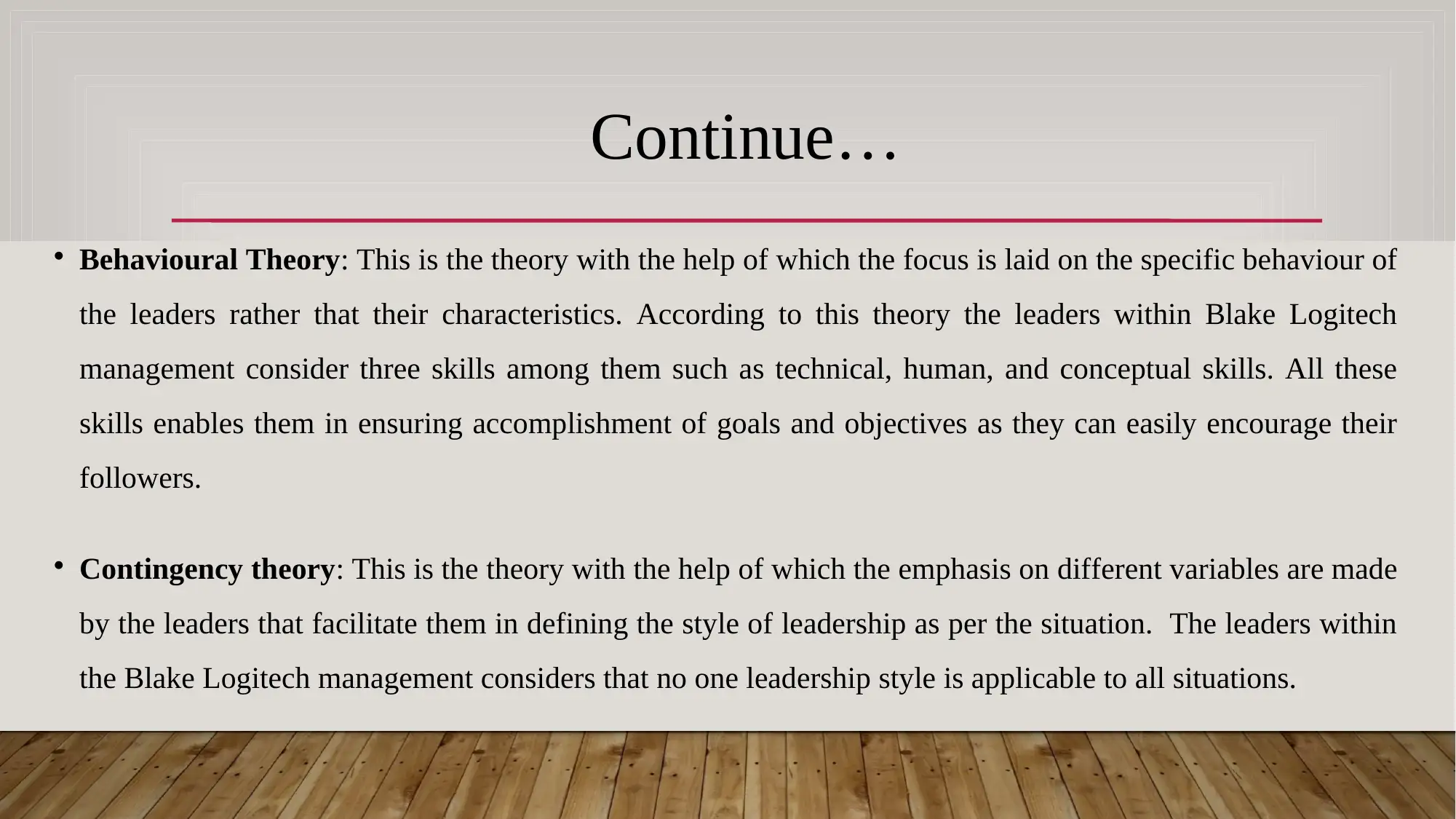
Continue…
Behavioural Theory: This is the theory with the help of which the focus is laid on the specific behaviour of
the leaders rather that their characteristics. According to this theory the leaders within Blake Logitech
management consider three skills among them such as technical, human, and conceptual skills. All these
skills enables them in ensuring accomplishment of goals and objectives as they can easily encourage their
followers.
Contingency theory: This is the theory with the help of which the emphasis on different variables are made
by the leaders that facilitate them in defining the style of leadership as per the situation. The leaders within
the Blake Logitech management considers that no one leadership style is applicable to all situations.
Behavioural Theory: This is the theory with the help of which the focus is laid on the specific behaviour of
the leaders rather that their characteristics. According to this theory the leaders within Blake Logitech
management consider three skills among them such as technical, human, and conceptual skills. All these
skills enables them in ensuring accomplishment of goals and objectives as they can easily encourage their
followers.
Contingency theory: This is the theory with the help of which the emphasis on different variables are made
by the leaders that facilitate them in defining the style of leadership as per the situation. The leaders within
the Blake Logitech management considers that no one leadership style is applicable to all situations.
⊘ This is a preview!⊘
Do you want full access?
Subscribe today to unlock all pages.

Trusted by 1+ million students worldwide
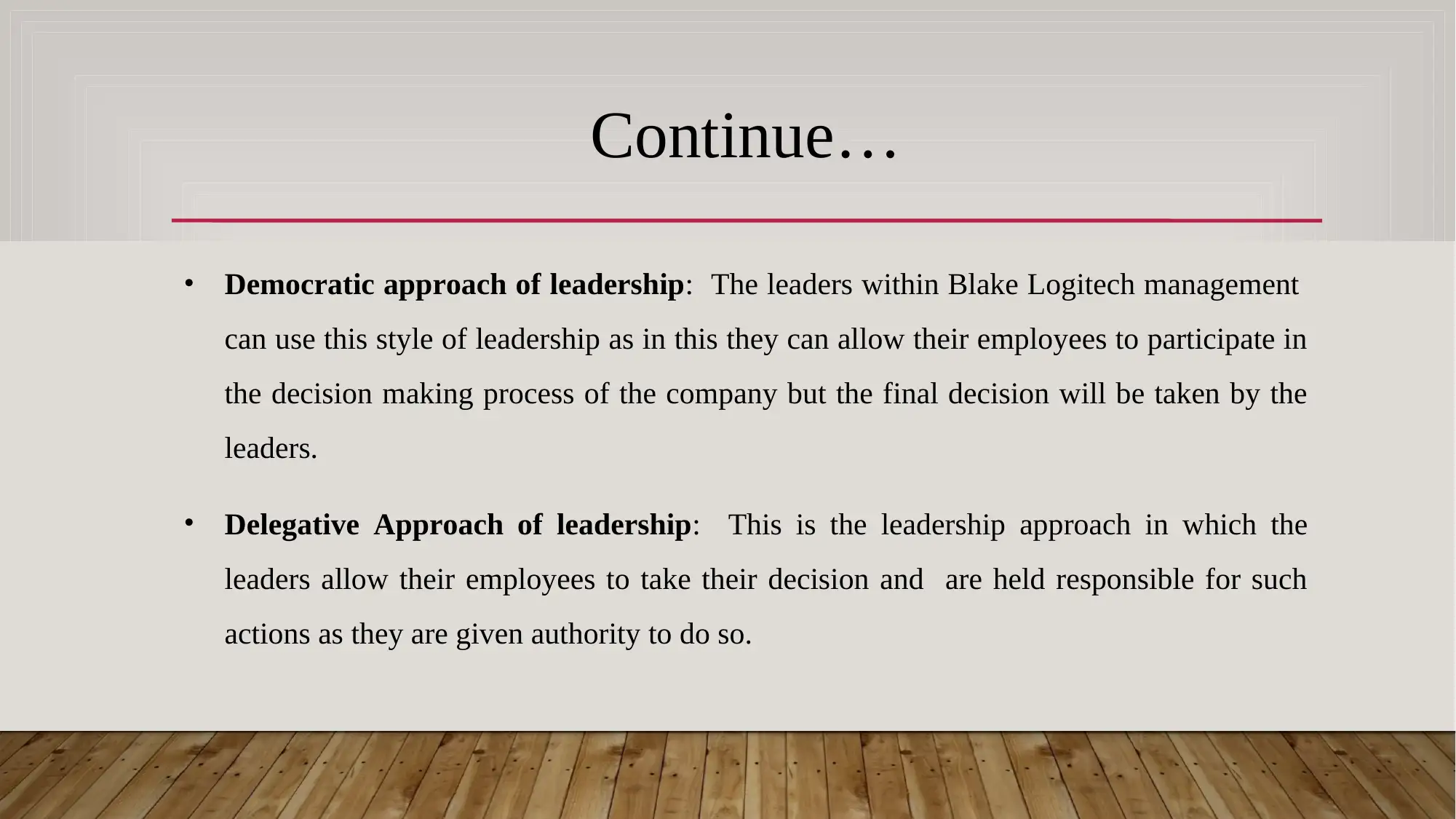
Continue…
• Democratic approach of leadership: The leaders within Blake Logitech management
can use this style of leadership as in this they can allow their employees to participate in
the decision making process of the company but the final decision will be taken by the
leaders.
• Delegative Approach of leadership: This is the leadership approach in which the
leaders allow their employees to take their decision and are held responsible for such
actions as they are given authority to do so.
• Democratic approach of leadership: The leaders within Blake Logitech management
can use this style of leadership as in this they can allow their employees to participate in
the decision making process of the company but the final decision will be taken by the
leaders.
• Delegative Approach of leadership: This is the leadership approach in which the
leaders allow their employees to take their decision and are held responsible for such
actions as they are given authority to do so.
Paraphrase This Document
Need a fresh take? Get an instant paraphrase of this document with our AI Paraphraser
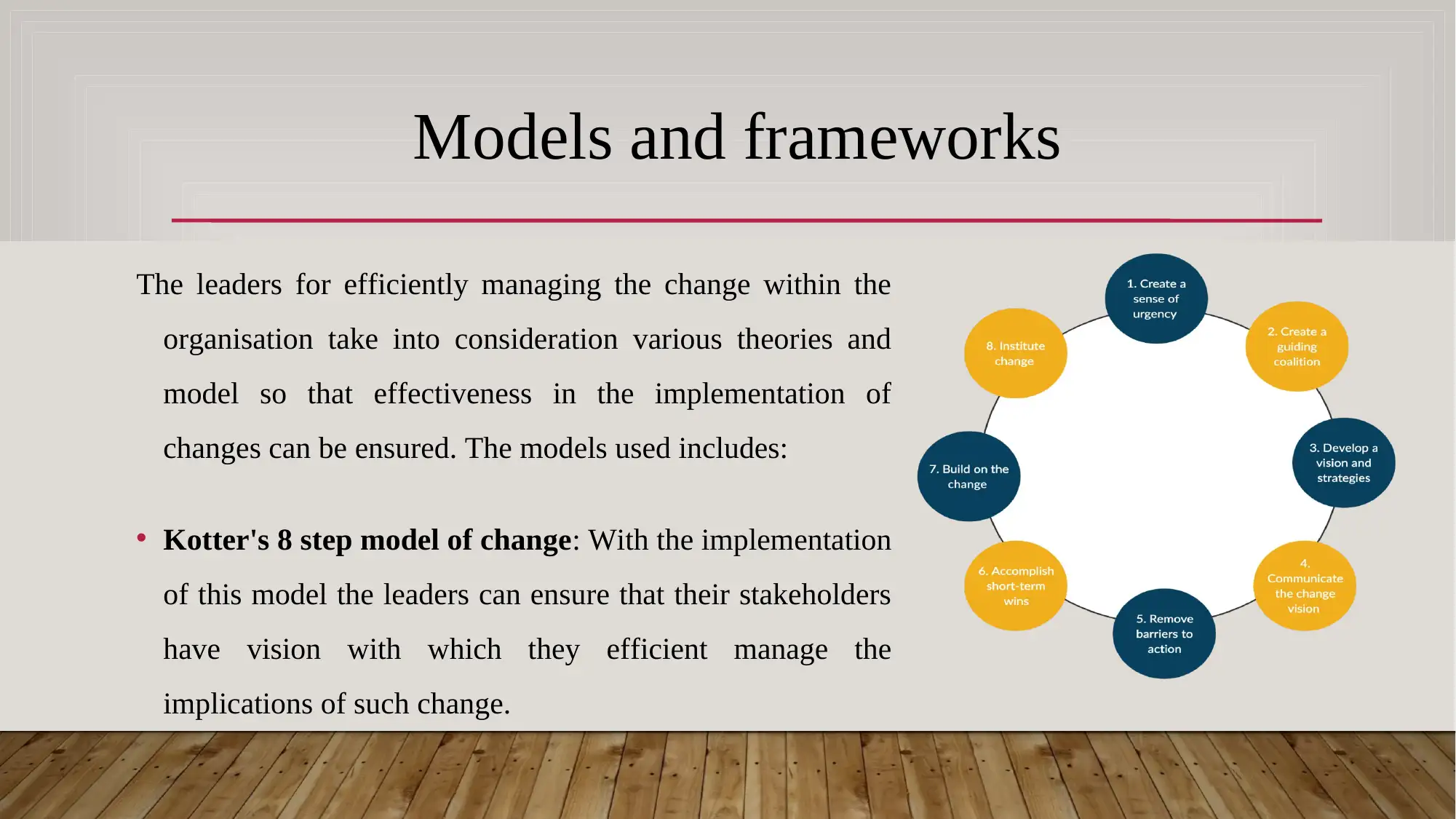
Models and frameworks
The leaders for efficiently managing the change within the
organisation take into consideration various theories and
model so that effectiveness in the implementation of
changes can be ensured. The models used includes:
• Kotter's 8 step model of change: With the implementation
of this model the leaders can ensure that their stakeholders
have vision with which they efficient manage the
implications of such change.
The leaders for efficiently managing the change within the
organisation take into consideration various theories and
model so that effectiveness in the implementation of
changes can be ensured. The models used includes:
• Kotter's 8 step model of change: With the implementation
of this model the leaders can ensure that their stakeholders
have vision with which they efficient manage the
implications of such change.
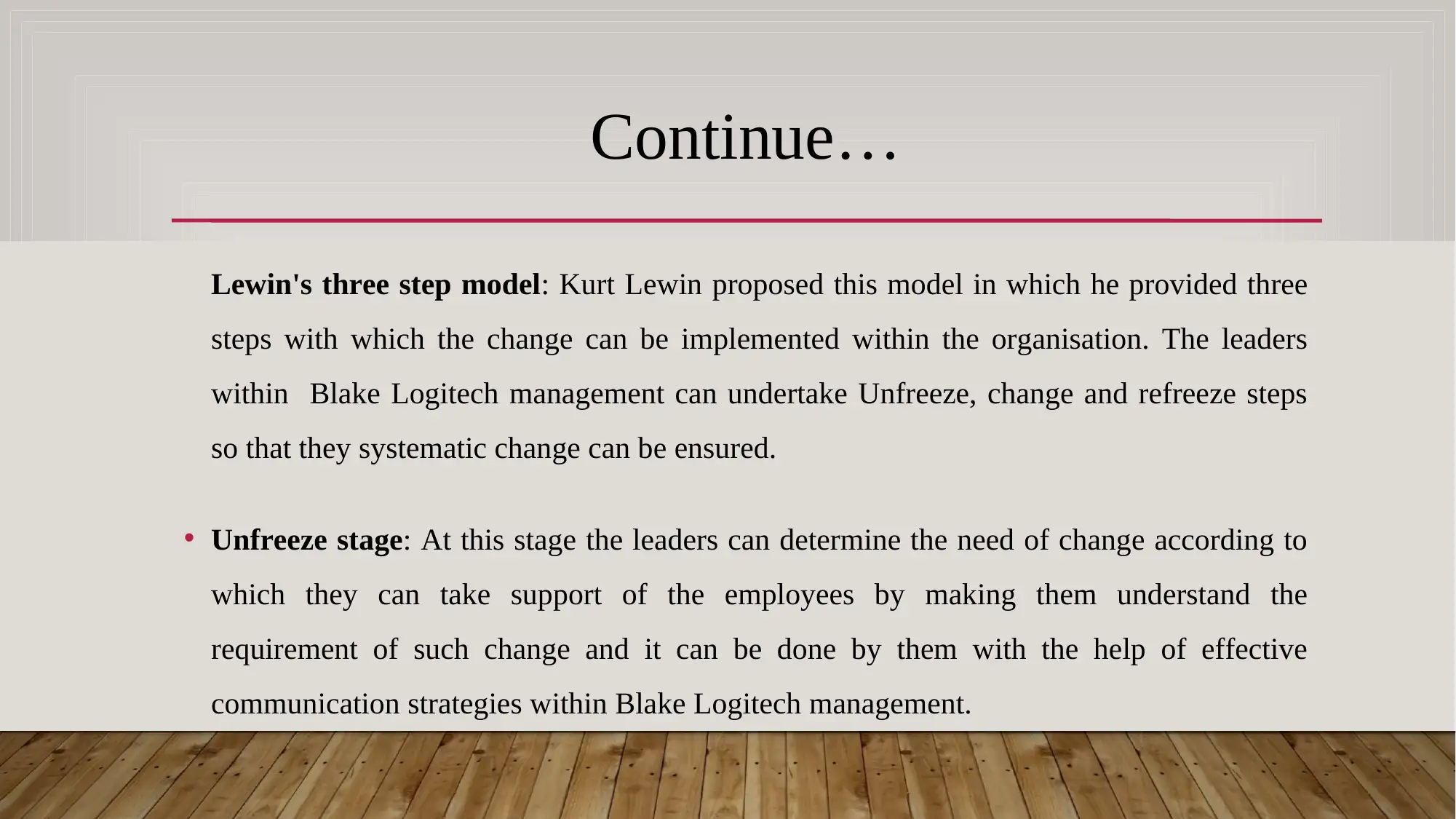
Continue…
Lewin's three step model: Kurt Lewin proposed this model in which he provided three
steps with which the change can be implemented within the organisation. The leaders
within Blake Logitech management can undertake Unfreeze, change and refreeze steps
so that they systematic change can be ensured.
• Unfreeze stage: At this stage the leaders can determine the need of change according to
which they can take support of the employees by making them understand the
requirement of such change and it can be done by them with the help of effective
communication strategies within Blake Logitech management.
Lewin's three step model: Kurt Lewin proposed this model in which he provided three
steps with which the change can be implemented within the organisation. The leaders
within Blake Logitech management can undertake Unfreeze, change and refreeze steps
so that they systematic change can be ensured.
• Unfreeze stage: At this stage the leaders can determine the need of change according to
which they can take support of the employees by making them understand the
requirement of such change and it can be done by them with the help of effective
communication strategies within Blake Logitech management.
⊘ This is a preview!⊘
Do you want full access?
Subscribe today to unlock all pages.

Trusted by 1+ million students worldwide
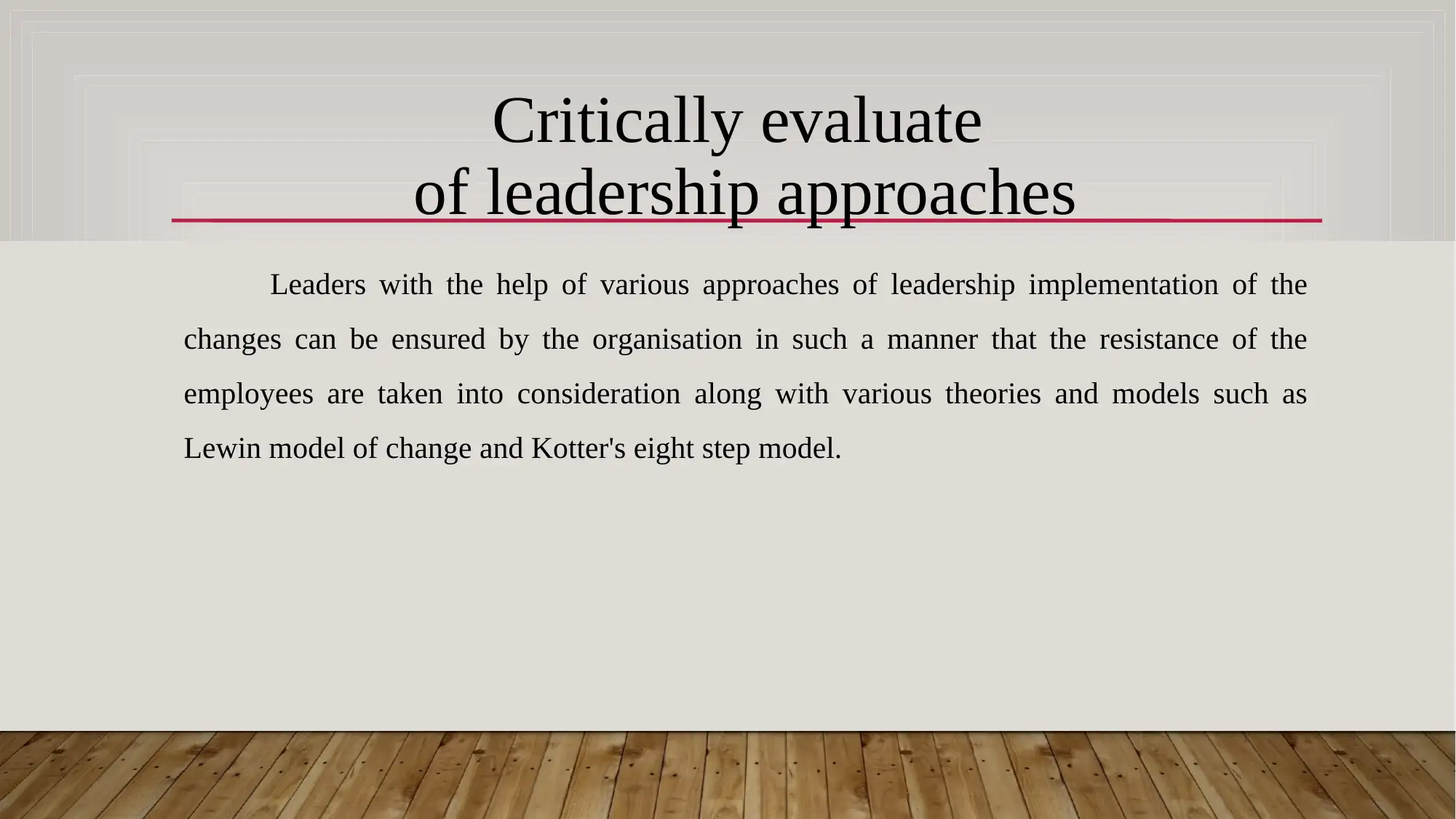
Critically evaluate
of leadership approaches
Leaders with the help of various approaches of leadership implementation of the
changes can be ensured by the organisation in such a manner that the resistance of the
employees are taken into consideration along with various theories and models such as
Lewin model of change and Kotter's eight step model.
of leadership approaches
Leaders with the help of various approaches of leadership implementation of the
changes can be ensured by the organisation in such a manner that the resistance of the
employees are taken into consideration along with various theories and models such as
Lewin model of change and Kotter's eight step model.
Paraphrase This Document
Need a fresh take? Get an instant paraphrase of this document with our AI Paraphraser
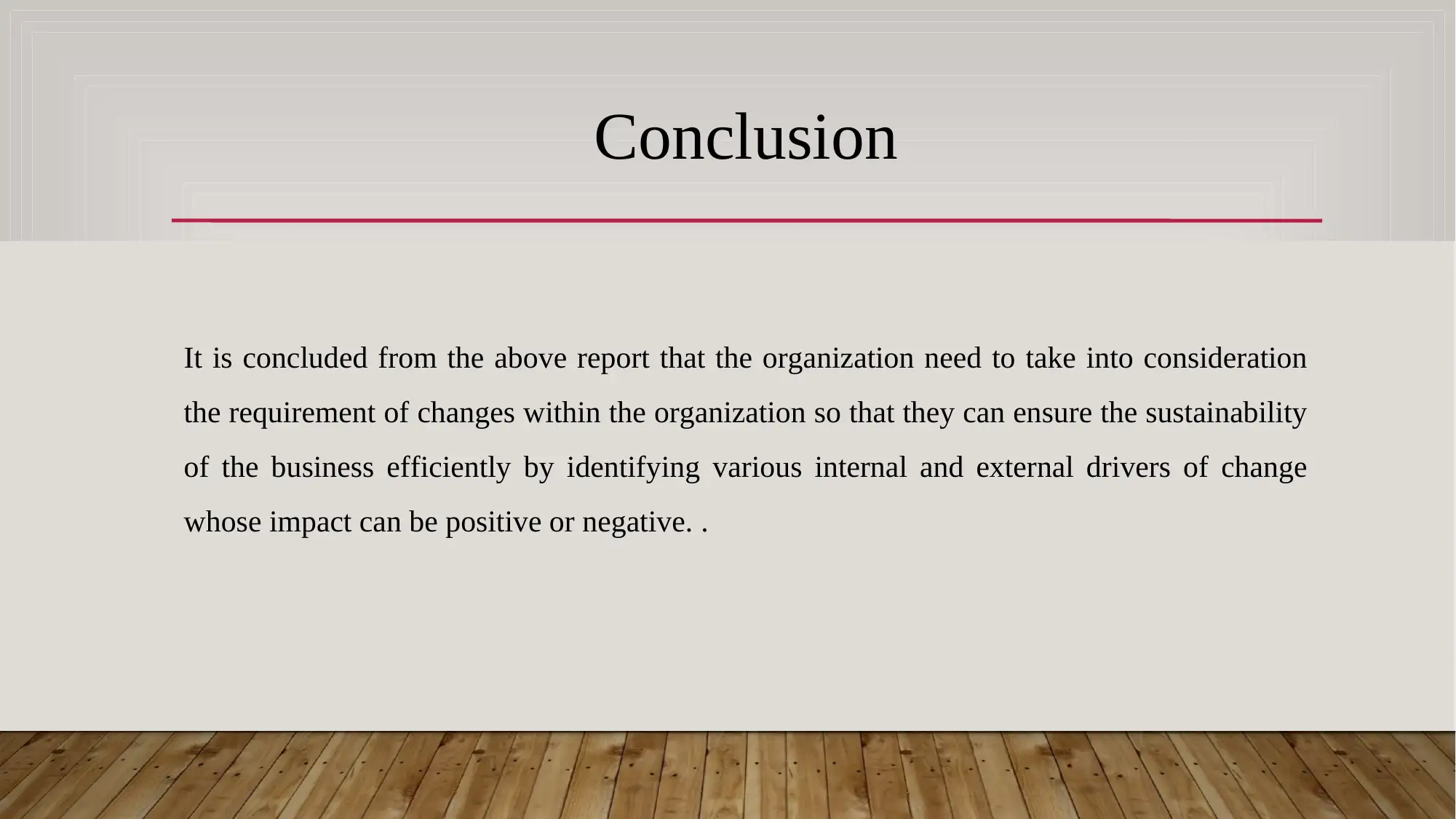
Conclusion
It is concluded from the above report that the organization need to take into consideration
the requirement of changes within the organization so that they can ensure the sustainability
of the business efficiently by identifying various internal and external drivers of change
whose impact can be positive or negative. .
It is concluded from the above report that the organization need to take into consideration
the requirement of changes within the organization so that they can ensure the sustainability
of the business efficiently by identifying various internal and external drivers of change
whose impact can be positive or negative. .
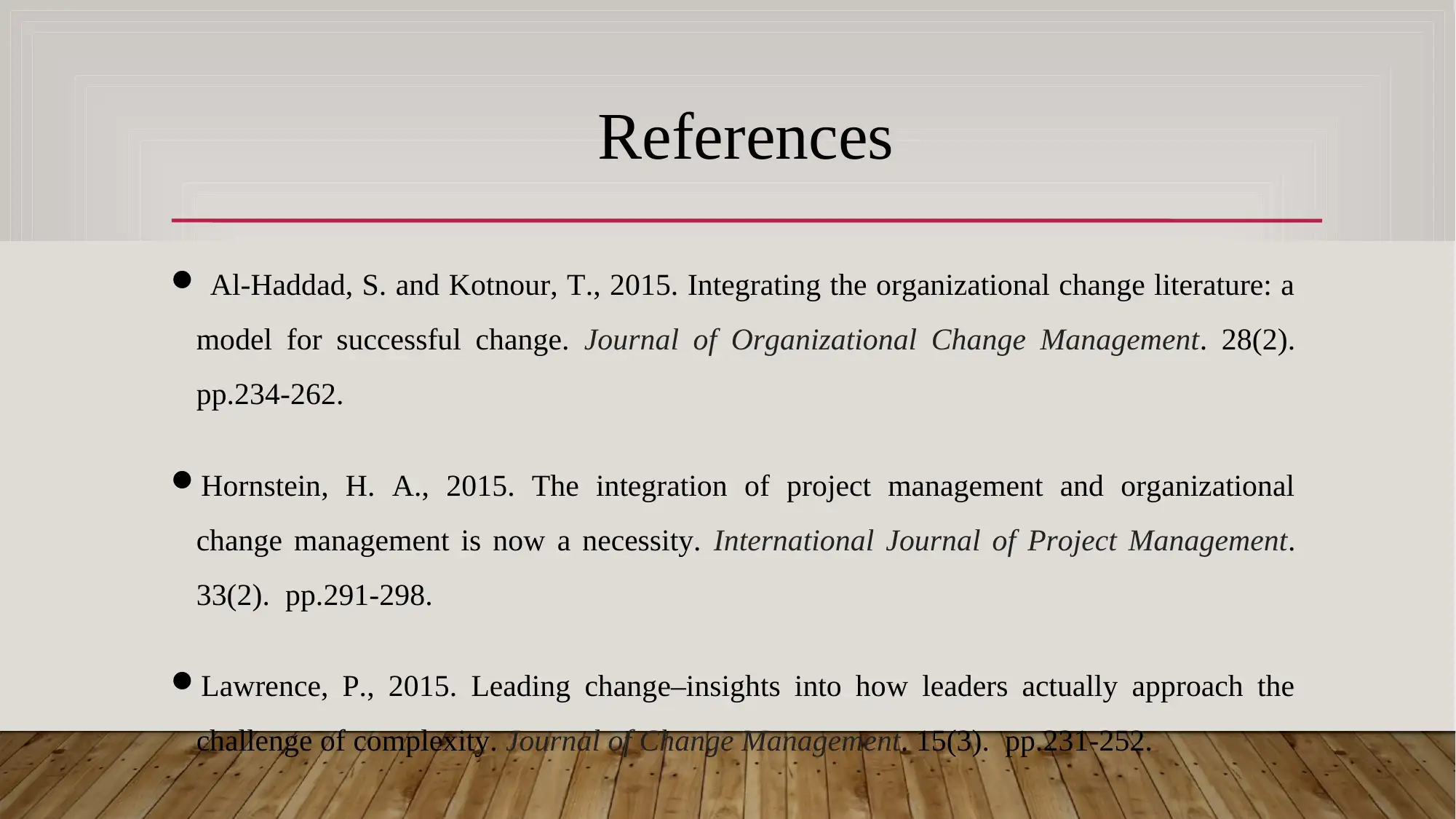
References
Al-Haddad, S. and Kotnour, T., 2015. Integrating the organizational change literature: a
model for successful change. Journal of Organizational Change Management. 28(2).
pp.234-262.
Hornstein, H. A., 2015. The integration of project management and organizational
change management is now a necessity. International Journal of Project Management.
33(2). pp.291-298.
Lawrence, P., 2015. Leading change–insights into how leaders actually approach the
challenge of complexity. Journal of Change Management. 15(3). pp.231-252.
Al-Haddad, S. and Kotnour, T., 2015. Integrating the organizational change literature: a
model for successful change. Journal of Organizational Change Management. 28(2).
pp.234-262.
Hornstein, H. A., 2015. The integration of project management and organizational
change management is now a necessity. International Journal of Project Management.
33(2). pp.291-298.
Lawrence, P., 2015. Leading change–insights into how leaders actually approach the
challenge of complexity. Journal of Change Management. 15(3). pp.231-252.
⊘ This is a preview!⊘
Do you want full access?
Subscribe today to unlock all pages.

Trusted by 1+ million students worldwide
1 out of 13
Related Documents
Your All-in-One AI-Powered Toolkit for Academic Success.
+13062052269
info@desklib.com
Available 24*7 on WhatsApp / Email
![[object Object]](/_next/static/media/star-bottom.7253800d.svg)
Unlock your academic potential
Copyright © 2020–2025 A2Z Services. All Rights Reserved. Developed and managed by ZUCOL.





